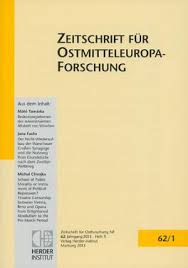Als „Latwija“ zu einem politischen Begriff wurde. Die Revision von 1882/83 durch Senator Nikolaj Manassein und das politische Denken der lettischen Nationalbewegung
When ‘Latwija’ Became a Political Term: Senator Nikolaj Manassein’s Revision in 1882/83 and the Political Thought of the Latvian National Movement
Author(s): Ivars ĪjabsSubject(s): Political Theory, Political history, Nationalism Studies, 19th Century
Published by: Verlag Herder-Institut
Keywords: Latvia; territorial autonomy; nationalism; Baltic Germans; Latvians; Russian Empire; political thought; Russification;
Summary/Abstract: This article deals with the development of territorial conceptions in early Latvian nationalist thought. ‘Latwija’ (Latvia) initially appeared in the Latvian press in the early 1860s as an ethnographic term designating the territory inhabited by ethnic Latvians. However, it acquired a connotation of political and administrative autonomy around 20 years later, when, after a prolonged debate on reforms in the Baltic provinces, the Tsarist Government organized a revision of social, economic and political conditions in Livonia and Courland. The revision, conducted in 1882-1883 by senator N. A. Manassein, served as an incentive for the Riga Latvian Association (RLA), the organizational centre of the Latvian national movement, to formulate its territorial and political program. It also had to define its stance towards the already existing self-government rights of the Baltic provinces in the Tsarist Empire, until now exercised only by the Baltic German nobilities. In order to explore the crystallization of the politico-territorial views, special attention is paid to the memorandum written by prominent RLA members and submitted to Manassein in 1882. Starting from late 1850s, the ‘Great reforms’ of Alexander II galvanized lively debates on future developments in the Empire’s non-Russian Western regions. In the Baltic provinces these debates took place in a very specific multicultural and multiethnic setting. This can also be seen from the crystallization of the concept of a territorially autonomous ‘Latwija’. Initially, the proposal to divide the three Baltic provinces (Livonia, Estonia, and Courland) along ethnic lines and to create two (an Estonian and a Latvian) governorates came from the Estonian neighbours. A group of Estonian activists, led by Carl Robert Jakobson, suggested a similar idea in its address to tsar Alexander III immediately after his ascension to the throne in 1881. The RLA greeted this idea as a wise plan and included it in its memorandum to Manassein, inviting to name the new Latvian government ‘Latwija’. The idea that the future government ‘Latwija’ should inherit the political privileges of Baltic German nobilities has deeper roots. It was already extensively discussed in the so-called ‘reform debate’ of 1877-1880, when a group of liberal Baltic German nobles proposed to extend the Livonian Landtag, the aristocratic quasi-parliament, to include the representatives of Latvian and Estonian peasantry. The Latvian nationalist press joined the Baltic German discussion, whereby the enlargement of the Landtag was discussed along with the introduction of Russian zemstvos. Although these reforms were never put into practice, the autonomy and special status of the Baltic provinces vis-à-vis the rest of the empire became a significant part of the Latvian political debate. The first program of autonomy of ‘Latwija’, formulated in the RLA memorandum to Manassein, helped to set the stage for further development of territorial-political concepts in the Latvian public sphere. E.g., the later fights about the territorial autonomy among the Latvian Social Democrats around the turn of the 20th century have their roots in the same distinction: the confidence in the modernizing potential of the Russian state versus the awareness of the cultural and economic superiority of the Baltic provinces.
Journal: Zeitschrift für Ostmitteleuropa-Forschung
- Issue Year: 65/2016
- Issue No: 3
- Page Range: 373-406
- Page Count: 34
- Language: German

